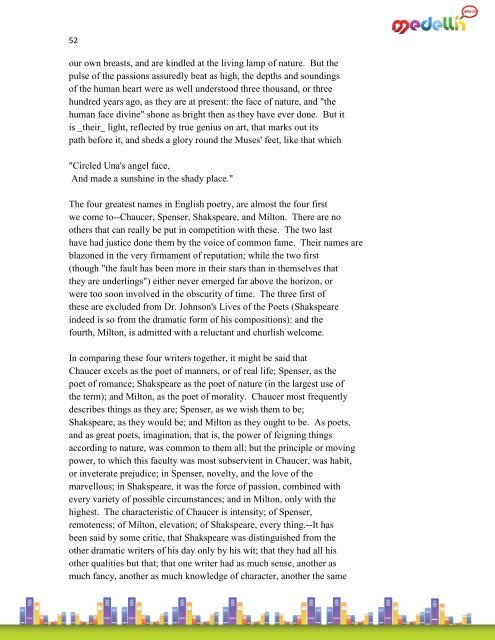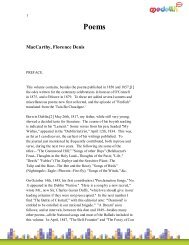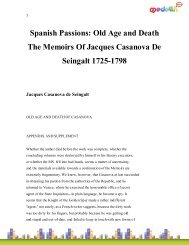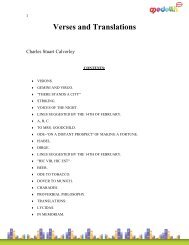Lectures On The English Poets William Hazlitt
Lectures On The English Poets William Hazlitt
Lectures On The English Poets William Hazlitt
You also want an ePaper? Increase the reach of your titles
YUMPU automatically turns print PDFs into web optimized ePapers that Google loves.
52<br />
our own breasts, and are kindled at the living lamp of nature. But the<br />
pulse of the passions assuredly beat as high, the depths and soundings<br />
of the human heart were as well understood three thousand, or three<br />
hundred years ago, as they are at present: the face of nature, and "the<br />
human face divine" shone as bright then as they have ever done. But it<br />
is _their_ light, reflected by true genius on art, that marks out its<br />
path before it, and sheds a glory round the Muses' feet, like that which<br />
"Circled Una's angel face,<br />
And made a sunshine in the shady place."<br />
<strong>The</strong> four greatest names in <strong>English</strong> poetry, are almost the four first<br />
we come to--Chaucer, Spenser, Shakspeare, and Milton. <strong>The</strong>re are no<br />
others that can really be put in competition with these. <strong>The</strong> two last<br />
have had justice done them by the voice of common fame. <strong>The</strong>ir names are<br />
blazoned in the very firmament of reputation; while the two first<br />
(though "the fault has been more in their stars than in themselves that<br />
they are underlings") either never emerged far above the horizon, or<br />
were too soon involved in the obscurity of time. <strong>The</strong> three first of<br />
these are excluded from Dr. Johnson's Lives of the <strong>Poets</strong> (Shakspeare<br />
indeed is so from the dramatic form of his compositions): and the<br />
fourth, Milton, is admitted with a reluctant and churlish welcome.<br />
In comparing these four writers together, it might be said that<br />
Chaucer excels as the poet of manners, or of real life; Spenser, as the<br />
poet of romance; Shakspeare as the poet of nature (in the largest use of<br />
the term); and Milton, as the poet of morality. Chaucer most frequently<br />
describes things as they are; Spenser, as we wish them to be;<br />
Shakspeare, as they would be; and Milton as they ought to be. As poets,<br />
and as great poets, imagination, that is, the power of feigning things<br />
according to nature, was common to them all: but the principle or moving<br />
power, to which this faculty was most subservient in Chaucer, was habit,<br />
or inveterate prejudice; in Spenser, novelty, and the love of the<br />
marvellous; in Shakspeare, it was the force of passion, combined with<br />
every variety of possible circumstances; and in Milton, only with the<br />
highest. <strong>The</strong> characteristic of Chaucer is intensity; of Spenser,<br />
remoteness; of Milton, elevation; of Shakspeare, every thing.--It has<br />
been said by some critic, that Shakspeare was distinguished from the<br />
other dramatic writers of his day only by his wit; that they had all his<br />
other qualities but that; that one writer had as much sense, another as<br />
much fancy, another as much knowledge of character, another the same

















